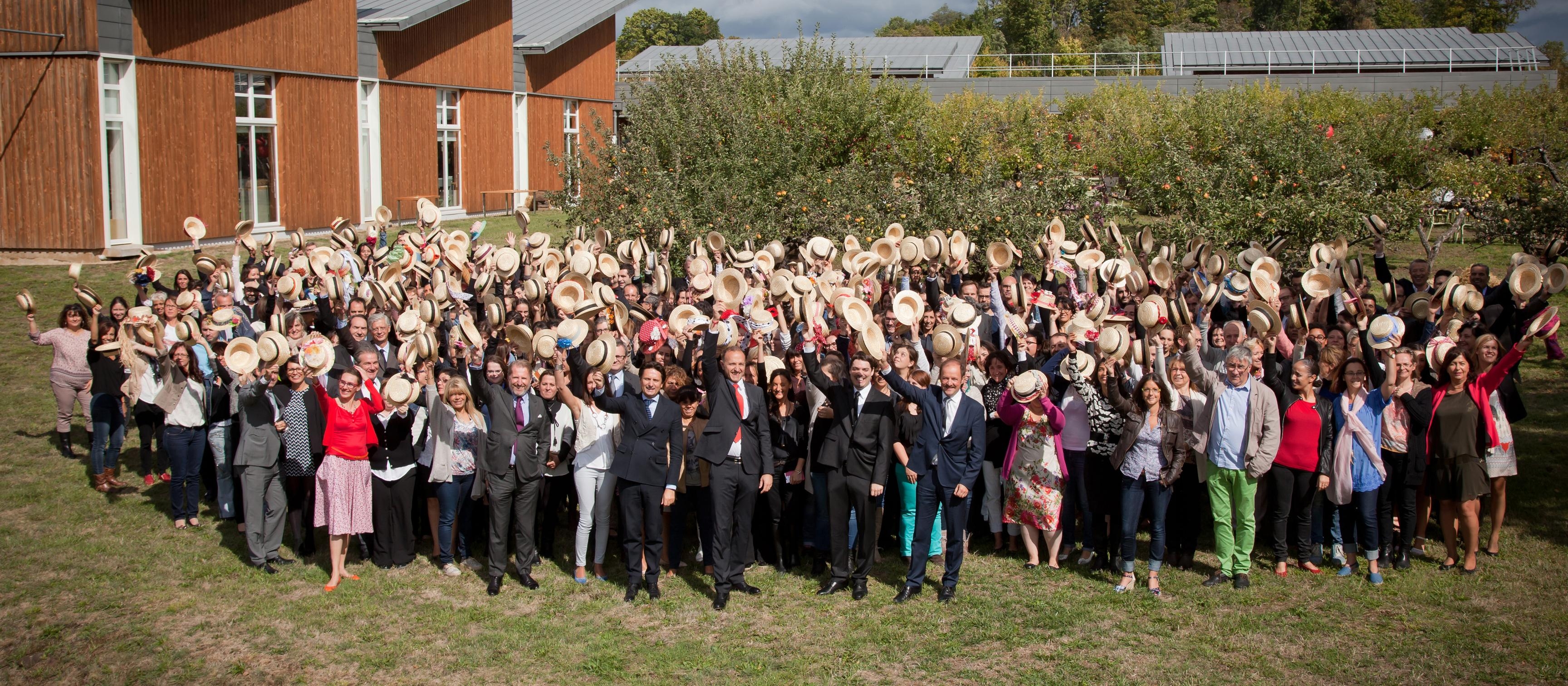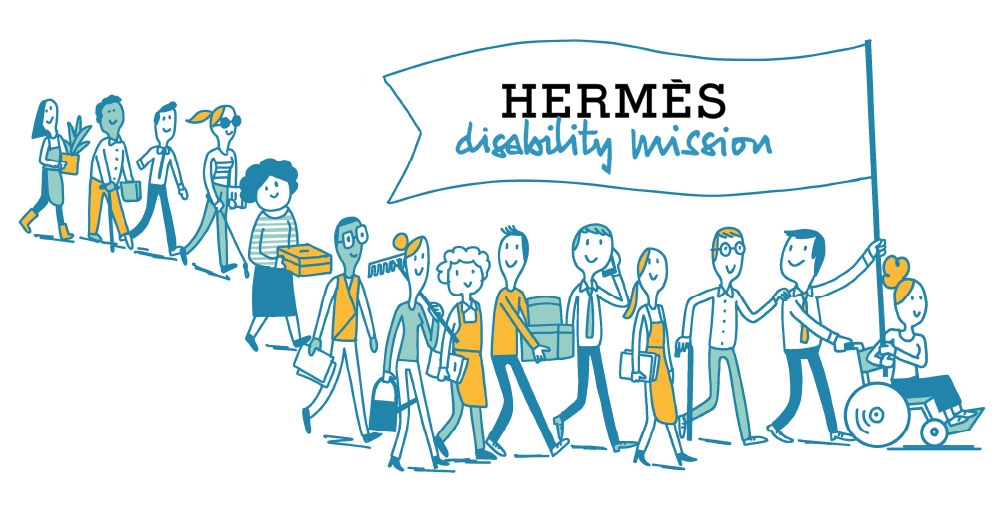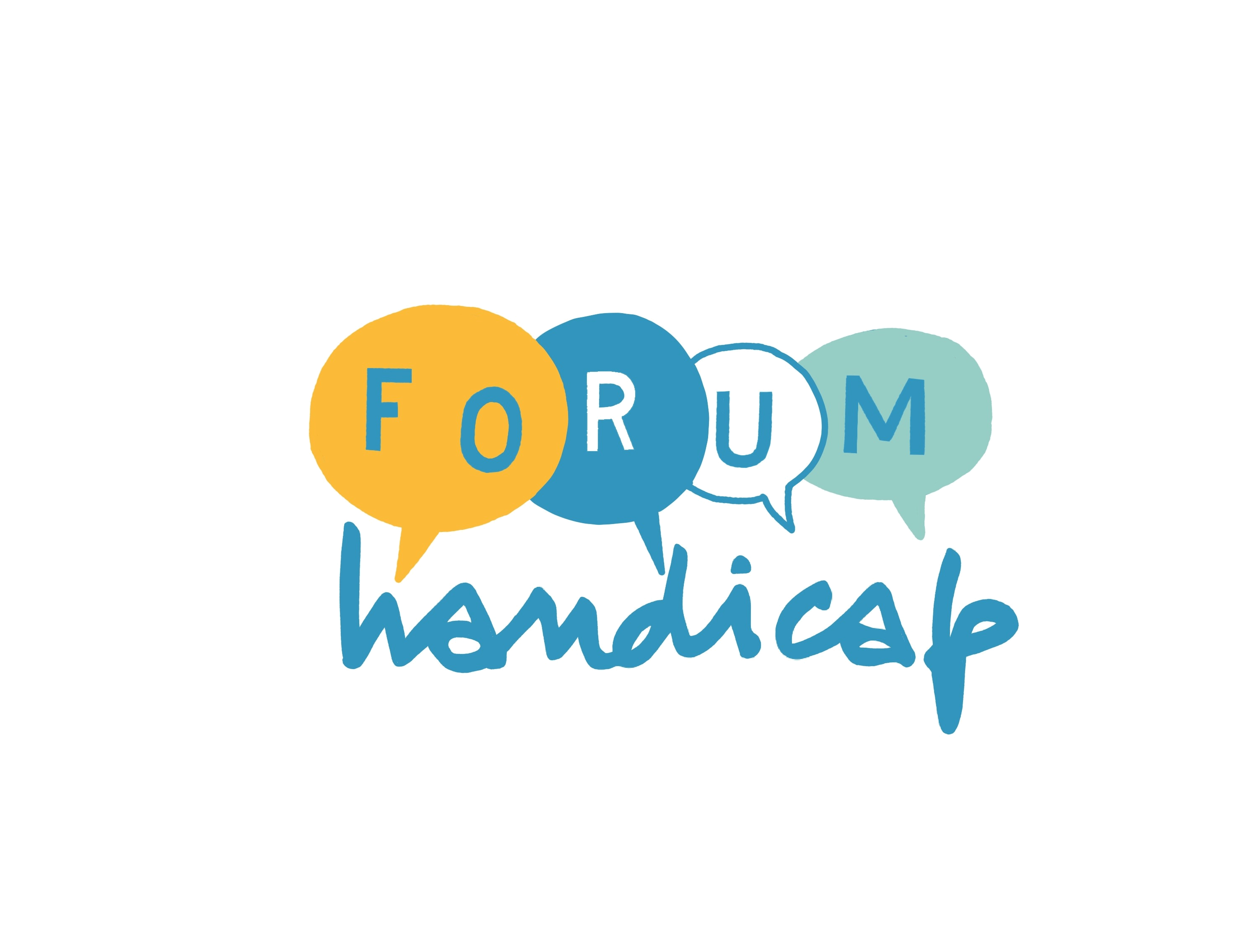
Ethics, Human Rights and Diversities - old
"Hermès is a mosaic of men and women working daily for its development all over the world. Beyond their uniqueness, the people who bring the group to life have a common desire to share certain unifying and founding values of the spirit that has characterised Hermès since 1837."
Henri-Louis Bauer President of the Executive Management Board of Émile Hermès SARL
Axel Dumas, Executive Chairman
Ethics
Ambition
Driven by its humanist values, the Hermès group’s approach to ethics is aligned with the universal framework of major international principles, standards and agreements. The group has a two-fold requirement: zero tolerance for breaches of probity and a determined commitment to an ethical culture.
Specific systems, supported at the highest level of the organisation, are in place, with tools that formalise our commitments and a policy concerning training, monitoring and alert.
Organisation
The Executive Committee oversees all ethical issues. It is supported by an Ethics Committee, set up in 2018. Chaired by a member of the Executive Committee, it is composed of the group legal director, the human resources director and the legal compliance director.
The committee oversees actions in relation to ethics and has two main missions: advising and making recommendations on the group’s ethical stance and handling internal alerts.
Objectives
Hermès values and commitments are formally laid out ind :
- the group’s code of ethics since 2009;
- the code of business conduct since 2012;
- the anti-corruption code since 2018.
These charters and codes, available in the “Find out more” section, are in line with fundamental principles, such as the Universal Declaration of Human Rights, ILO and OECD rules and the United Nations Global Compact on sustainable development.
Hermès also requires its suppliers to adhere to an ethical, social and environmental policy by signing a dedicated charter called the supplier “Handbook 2”.
Training, inspection and alert policy
The group has set up training courses on ethics and integrity. This training is provided locally, or at seminars, such as the buyers’ seminar. In addition, it has set up a group e-learning system dedicated to ethics and anti-corruption, in place since 2021 and mandatory for all persons considered to be exposed to the risk of corruption, in accordance with the group corruption risk map.
A network of compliance officers has been set up in the métiers and subsidiaries to ensure the dissemination of good practices and as a second line of control, to complement the work of the internal audit teams.

“H-Alert”, ethics alert system
Hermès Group maintains relationships with its employees and partners based on trust and open communication.
Employees and external stakeholders of the Hermès Group (suppliers, partners, etc.) who are aware of violations (or the risk of violations) of the Group's commitments and policies and/or applicable laws are invited to report these situations via the H-Alert!
Group employees may report such irregularities or breaches to their supervisor, human resources manager or members of the Ethics Committee.
External stakeholders may report any such incidents directly to their usual contact.
In addition to this channel, Hermès employees and external stakeholders can send their reports confidentially and securely using H-Alert! platform. This platform is available seven days a week, 24 hours a day.
This platform can be accessed via the following link: https://report.whistleb.com/fr/hermes-alerte
Cybersecurity and personal data protection
The Hermès Group is developing its cybersecurity and personal data protection strategy for its customers, employees and operations. The CISO chairs a set of committees allowing to follow on projects and cyber risk evolution in order to report back to the Executive Committee (specifically to the Managing Director Métiers, Information Systems and Data) and then to the audit and risk committee.
These initiatives are organized in the newest active roadmap 2023-2025, organized into 3 pillars: maintain fundamentals, adapt to new threats and strengthen resilience. Existing security and resilience mechanisms are subject to an array of tests throughout the year.
Company internal rules (règlement intérieur) and Global Information Systems Security Policy (G-ISSP) are the reference documents, based on international standards (such as NIST CyberSecurity Framework or ISO 27001) and security best practices.
IT security and procedural compliance audits are carried out periodically for all subsidiaries, in collaboration with the Audit and Risk Department and with the help of external service providers. They ensure that internal control systems remain effective and adapted to the main current and emerging threats, and that they are properly aligned with the laws and regulations applicable where the company operates.
In this capacity, Hermès is fully committed to the creation and running of the Cyber Campus, whose mission is to bring together digital security players in a totem pole location to protect society and promote French excellence in this field. CERT Hermès, which is now part of InterCERT France, operates from the Campus.
Compliance
Human rights
Ambition
Sustainable development at Hermès rests on the ability of its partners and suppliers to develop in a sustainable manner with respect to social, environmental and ethical issues, particularly human rights, fundamental freedoms, employment conditions and respect for nature and biodiversity.
More broadly, Hermès contributes to the implementation of responsible sustainable development practices by supporting its partners and exercising a rigorous duty of vigilance.
Due to the fact that 55% of products are manufactured internally, the majority of production operations (74%) are located in France, and the proportion of operations outside the group and outside Europe is low, the risks of non-compliant practices are easier to control. This is also helped by the company’s proximity to its suppliers.
Organisation
The legal compliance department contributes to the identification of risks to human rights and fundamental freedoms and to the development of measures to prevent violations, particularly within supply chains.
To do so, it works with the group’s main support departments. In the context of respecting and protecting human rights and fundamental freedoms, the Hermès group is committed to:
- Defining frames of reference to identify these risks;
- Designing and implementing prevention and monitoring actions;
- Disseminating the culture of compliance and ethical practice to all the group’s employees.
Objectives
Hermès is committed to promoting respect for human rights and fundamental freedoms and the group’s ethical approach is in line with the universal framework of major international principles, standards and agreements. In particular, Hermès is committed to respecting:
- the Universal Declaration of Human Rights ;
- the European Union Charter of Fundamental Rights ;
- the International Labour Organization (ILO) Declaration on Fundamental Principles and Rights at Work, which covers principles grouped under the following themes: freedom of association, forced labour, child labour, discrimination;
- the OECD guidelines.
The Hermès group is also a signatory to initiatives including the UN Global Compact. Our page on the Global Compact website attests to our membership since 2003.
In addition, it is committed to acting to protect human rights as laid out in the Due Diligence Act (Switzerland), the Modern Slavery Act (in the UK), the Figthing Against forced labour and Child Labour Act (Canada) and the California Transparency in Supply Chains Act (in the US).
- our UK subsidiary’s statement concerning the Modern Slavery Act
- our statement concerning the California Supply Chain Act
- the Swiss Due Diligence reports : Hermès Suisse and La Montre Hermès
- our Canadian subsidiary's statement on the Fighting against forced labour and child labour in Supply Chains Act
The management system
The vigilance plan
In accordance with Act 2017-399 of 27 March 2017 concerning duty of vigilance, the Hermès group has drawn up a vigilance plan to identify risks and prevent serious violations concerning human rights and fundamental freedoms, the health and safety of individuals and the environment resulting from its activities and those of its suppliers and subcontractors.
Regular audits of suppliers
Hermès has put in place procedures for carrying out regular assessments of its suppliers and subcontractors. These audits allow the company to verify the reality of the suppliers’ commitments in situ.

Results 2023
Diversities and inclusion
Ambition
Maintaining diversities among its people and talent is the foundation of the brand’s wealth and creativity. The group is highly committed to the principles of recognition, respect and equal opportunities. The group prohibits any situation of discrimination, as defined by French law or any other legislation depending on the country concerned.
Governance
The diversity policy is overseen by a member of the Executive Committee in charge of organisational governance. It is based on the values and ethics of the House and on the actions overseen by the Group’s Human Resources Department. In order to initiate this approach and give visibility to the action plans defined locally, each métier and/or each country appointed a Diversity & Inclusion (D&I) Officer, set objectives, a timetable for actions and monitoring indicators. The Group labour relations department will provide input to this network of 28 D&I Officers, covering 100% of the Group’s workforce, several times a year.
Objectives
Diversity of talent is a source of wealth, creativity and innovation. The “Hermès, Responsible Employer” policy aims to facilitate the integration of all employees by developing concrete actions to promote:
- ethics: respect for difference is presented to employees in the ethics charter, created in 2009 and updated in 2023, which guarantees objectivity, equal opportunities and the promotion of diversities and the absence of discrimination in recruitment, career development and daily management;
- management of diversities: through the “Alterego” training programme, which demonstrates the benefits of difference for the company and thus reinforces fair and impartial management in access to employment and career management;
- social diversity: to promote diversities, Hermès focuses its recruitment methods on greater inclusion, in particular by encouraging the hiring of long-term jobseekers and senior citizens and by using aptitude tests rather than CVs whenever possible;
- gender equality: equality between men and women is one of the fundamental principles supported by the group. Particular attention is given to the provision of equal pay for equal work and equal opportunities at all levels of employment;
- people with disabilities: Hermès has long been concerned with the integration of people with disabilities into its different métiers. Through the signature of a group agreement, the company has set itself the ambitious target of increasing its use of the socially supported organisations in France by 20% a year between 2021 and 2023. The house also aims to maintain the rate of workers with disabilities in France above the legal minimum employment rate (6%).
Gender equality
Gender distribution
Particular attention is paid to equal pay for equal work and equal opportunities at all levels of employment. Training is provided to management and the subject is specifically addressed in human resources department meetings.
| French Gender Equality Index 2024 * | 92/100 |
| Proportion of female managers | 60% |
| Proportion of women in senior management | 60% |
| Proportion of women on the Supervisory Board | 50% |
* Measures the overall index of weighted averages of the gender pay gap, the gender gap in pay increases, the gender gap in promotions, the number of female employees receiving a pay rise after returning from maternity leave and parity among the top 10 highest earners.
Workers with disabilities
Hermès has chosen to implement a policy to integrate and retain workers with disabilities across its different métiers. In 2020, this became a long-term commitment with the signing of the second group disability agreement by all the union coordinators to address the following issues:
- Promoting the employment and integration of people with disabilities ;
- Creating a job retention policy ;
- Reinforcing indirect employment through collaboration with organisations helping people with disabilities into work and self-employed disabled workers ;
- Reinforcing the fight against decision-making biases induced by stereotypes or prejudices in relation to disability and changing attitudes within the company through information and communication.

Mission handicap
The Group Disability Agreement are led by a network of 16 disability advisors across all the group’s métiers. A significant training plan for recruiters and human resources on the recruitment of people with disabilities has been put in place, to ensure they feel at ease recruiting people with disabilities.

The Handi'Cap forum
On the occasion of World Disability Day in early December, the Handi’Cap 2023 forum, an annual highlight organised exceptionally in virtual form, brought together nearly 250 new managers and new disability officers, essential levers for the effective implementation of the Disability policy.
Hermès continued its three-year partnership with Sciences Po Paris on the “Accessible” programme, dedicated to students with disabilities. Students with disabilities had meetings for internships, sandwich courses and jobs.
An inspiring initiative
Our relationship with the Equiphoria institute has become a partnership in which our savoir-faire is used to the benefit of people with a disability.
The collaboration between Equiphoria and the Equestrian métier was born out of a need experienced by this equine therapy and hippotherapy centre (treatment using the movement of horses) based in Lozère in finding equipment that ensures the comfort of both the horse and the safety of their severely disabled patients. Using a scientific approach and a multidisciplinary team bringing together both therapists and horse specialists, Equiphoria works to improve the neurological function in people with motor or mental disabilities, using the horse’s gait: “The human brain has the impression of walking”.
Learn more about
Discover how ethics and diversity take part in our strategy "All artisans of our sustainable development".
Download our documents:




